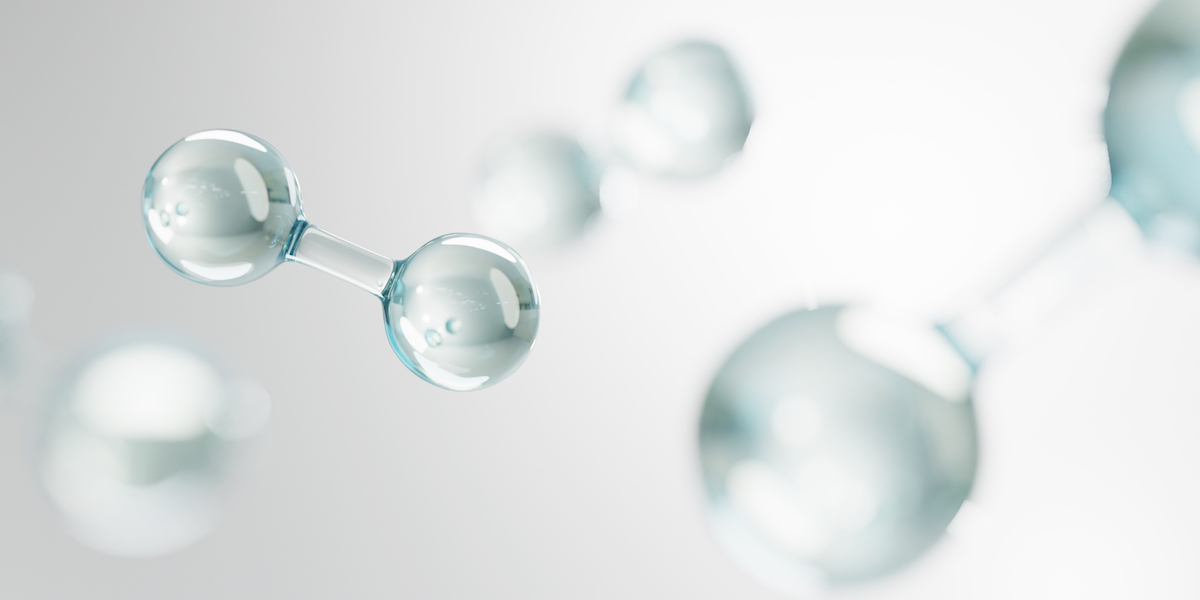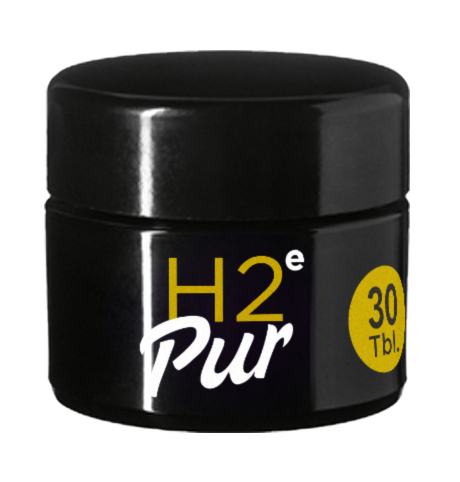Molecular Hydrogen (H2): the lightest and smallest element with multiple positive effects in all areas of the body.
Hydrogen is the most common element in the universe and essential for life on earth. It is the element with the lowest mass and ranks first in the periodic table. Hydrogen is also a powerful antioxidant that can protect cells from damage. Therefore, in recent years, scientists have increasingly turned their attention to the potential health benefits of hydrogen.
Studies have shown that hydrogen can reduce oxidative stress, inflammation and cellular damage, which have been linked to a number of cell proliferation symptoms such as “cancer”, cardiovascular problems, neurodegenerative changes such as Alzheimer’s disease and hypoglycaemia or insulin deficiency (diabetes). Hydrogen can also accelerate the healing of wounds and improve muscle regeneration. Although research into the health benefits of hydrogen is still in its infancy, it is a promising new therapeutic agent that has the potential to treat a wide range of diseases.
What is molecular hydrogen?
Molecular (free) hydrogen is a chemical compound of two hydrogen atoms (H2). It is the most common element in the universe. Hydrogen is a colourless, odourless and tasteless gas that is lighter than air. It is highly flammable and explosive. The chemical element hydrogen is abbreviated with the symbol H for hydrogenium. Normally, it consists of a positively charged proton and a negatively charged electron. Because they only have one electron, hydrogen atoms are particularly reactive, so that hydrogen only occurs in its atomic form under special circumstances. As a rule, two hydrogen atoms combine to form an H2 molecule (molecular hydrogen or free hydrogen). The result is a colourless, non-toxic, odourless and tasteless, non-metallic gas.
Medical benefits of hydrogen
For a long time, no effect on the human body could be detected in medical research. The first experiments with positive results in 1975 did not attract any attention, so the astonishment – at least in Asia – was all the greater after the publication of the research results in 2007. In Japan and Korea, the study is considered a medical breakthrough.
According to the study, hydrogen is used in the human body in two ways: as an energy supplier and as a selective antioxidant. Hydrogen is released when carbohydrates and fats are broken down. This is then bound to certain molecules in the mitochondria and stored. The reaction with oxygen produces energy, which is absorbed and transported by the energy carrier ATP.
Molecular hydrogen (H2), on the other hand, acts like a radical scavenger (antioxidant): It neutralizes harmful reactive oxygen and nitrogen radicals that are produced by cellular respiration, stress and pathological processes in the body, among other things.
Molecular hydrogen selectively against excessive free radicals
Free radicals are molecules or atoms with one or more unpaired electrons. They are highly reactive and can damage other molecules. As long as they do not have a complete pair of electrons, they try to replace the missing electron by taking an electron away from other atoms or molecules.
Free radicals occur naturally in the body as a by-product of metabolism. However, they can also be increasingly produced by environmental influences such as UV radiation, smoking and alcohol consumption. If there is an excess, there is a danger that they will cause damage in the body and trigger chain reactions. Therefore, it is important to protect oneself from the excessive formation of free radicals in order to stay healthy. To prevent an excess, the body can take countermeasures: with the help of the body’s own radical scavengers and enzymes such as glutathione, radicals are neutralized and thus rendered harmless. Antioxidants (vitamins, secondary plant compounds) also enter the body through food and support this process.
Due to one-sided nutrition such as fast food, denatured food, disturbance of nutrient intake and nutrient diversity or increased nutrient requirements due to permanent stress, the body forms more radicals than it can neutralize. This leads to oxidative stress, which in turn leads to further damage in the body in the long run. Such damage occurs in many chronic diseases. It is assumed that oxidative stress is a decisive factor in the ageing process.
Effective neutralization through hydrogen
Radicals are thus produced during completely natural processes in the body during metabolism. To prevent them from causing damage, we need sufficient radical scavengers in the form of antioxidants. Sometimes, however, such large quantities of free radicals are produced that the body’s own antioxidants are not sufficient.
Molecular hydrogen by nature has only one electron and therefore “likes” to combine selectively with certain oxygen radicals. In this way, hydrogen converts these radicals into a useful substance. It is particularly important that hydrogen spreads easily and quickly in the body, and thus acts quickly and selectively. Previous research results indicate that molecular hydrogen has a positive effect on diseases such as arteriosclerosis, type 2 diabetes, allergies, Alzheimer’s and Parkinson’s by effectively neutralizing radicals.

Advantages of molecular hydrogen
Compared to other forms of antioxidants such as vitamins or secondary plant substances, molecular hydrogen has decisive advantages. The use of hydrogen gas in humans has no harmful side effects. Hydrogen molecules can easily penetrate all tissue structures and spread rapidly through the body. And: the molecules can also enter cells that are covered by a layer of fat and filled with fluid.
Molecular hydrogen: easy and safe to use
Depending on personal needs, hydrogen can be taken in different ways. You can inhale air enriched with hydrogen gas. Or you can add it to liquids as a tablet and drink it. When doing so, it is important to follow the manufacturer’s instructions, as the hydrogen produced in the water (or tea, coffee, diluted fruit juice) quickly evaporates as a gas. The longer the mixture stands, the lower the concentration in the water. The more hydrogen is released or enters the body, the more effectively it can exert its effects.
You should also pay attention to the quality of the water. Good drinking waters available on the market are, for example, the brands Lauretana, Plose and Black Forest. In the long run, a water filter system (without electricity) such as the UMH Hexagon is cheaper and offers water activation and energization.
Advantages of H2 Pur energized
- Smallest and lightest molecule which reaches every part of the body
- Increase of physical performance and energy production
- Faster regeneration after physical or mental activity
- Helps with many different types of headaches
- Improves disturbed digestive function
- Effective and selective antioxidant (neutralization of free radicals)
- Optimal anti-ageing effects on skin, connective tissue and cell structures
- Effect up to the mitochondria, against mitochondriopathies
- Over 300 studies show positive effects on almost every part of the body
- No risks and side effects at recommended dosage
- Best possible protection in violet glass



